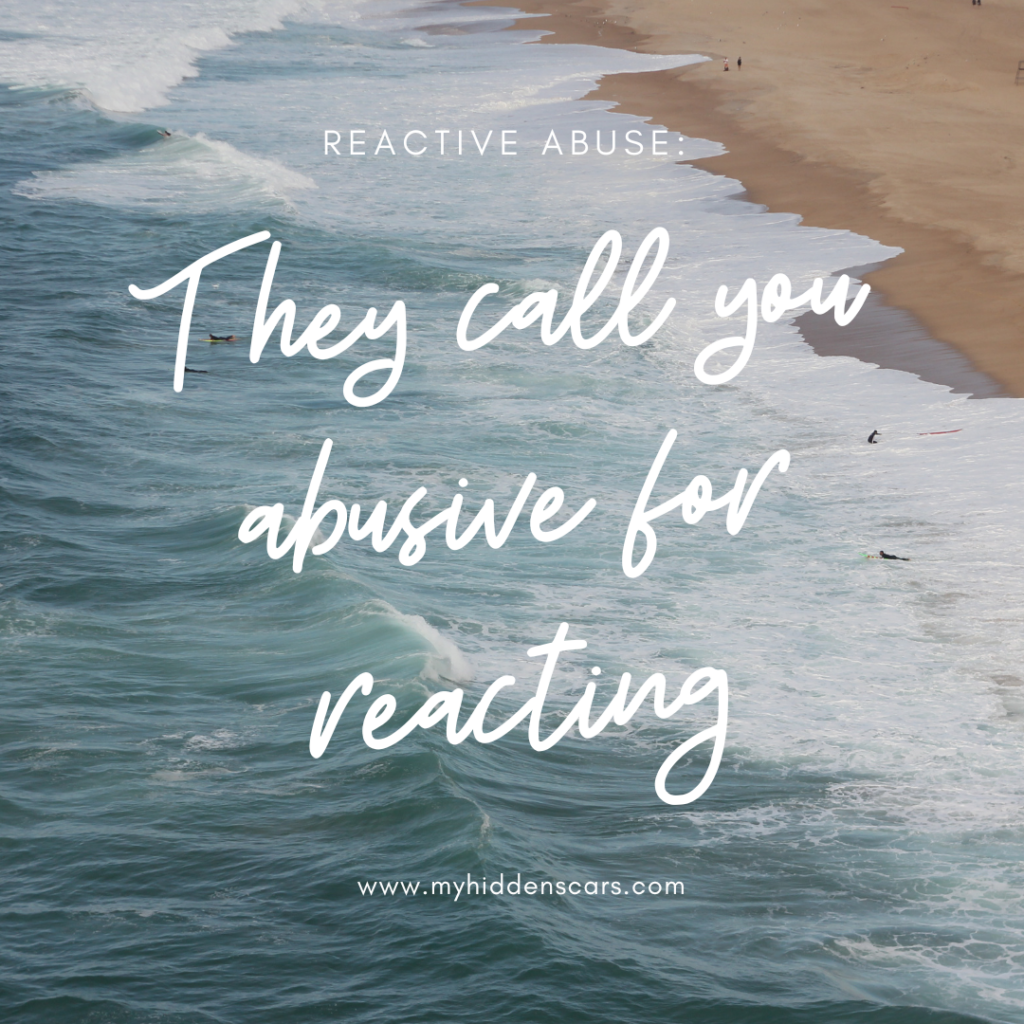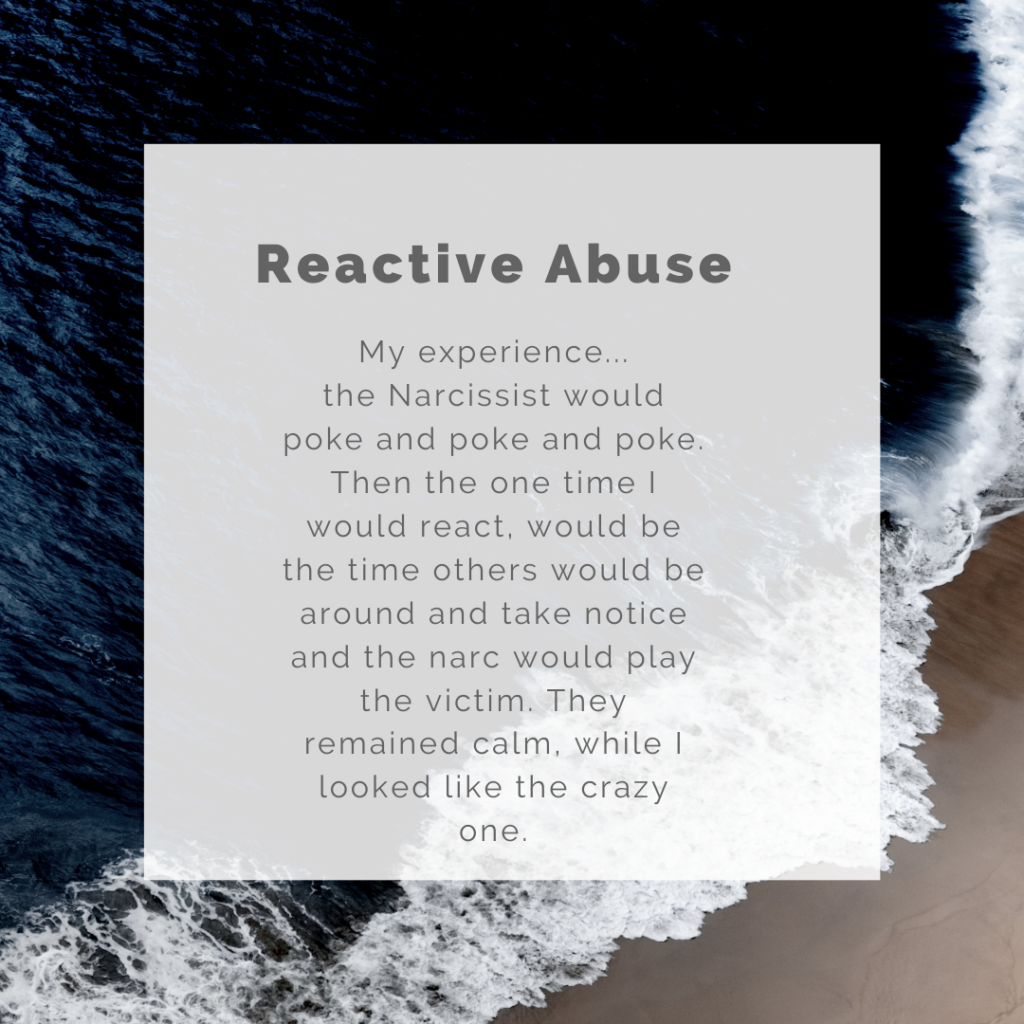Reactive abuse is one of the most misunderstood pieces of narcissistic abuse and one of the most painful. It’s when a victim, after being repeatedly provoked, manipulated, or gaslighted, finally reacts, yelling, crying, snapping, and suddenly they’re the one being called abusive.
I want to break this down clearly, not just as a coach, but as someone who’s been there. In this post, I’ll explain what reactive abuse is, what it looked like in my own life, and how you can begin to break free from the guilt and confusion it causes.
What Is Reactive Abuse (And What It Isn’t)?
Reactive abuse happens when someone being emotionally or psychologically abused finally reacts — often in ways that feel out of character for them. This might look like shouting, slamming a door, or lashing out after being pushed past their limit.
The abuser, especially if they’re narcissistic, uses this moment to shift the narrative. They stay calm, play the victim, and point the finger at you — making it look like you’re the unstable one. Meanwhile, they’ve spent days, weeks, or even years poking, prodding, and pushing until you break.
“There were so many times during my marriage when I felt like I was losing my mind. He would push me to the edge — and when I finally snapped, he’d say I was unstable, overreacting, or needed help. I didn’t know it then, but I was reacting to the abuse. I just didn’t have the words for it yet.”
How to Recognize Reactive Abuse (In Yourself or Someone You Love)
One of the most painful parts of reactive abuse is how confusing it can be. You don’t even realize what’s happening — and then you’re left wondering if you were the problem all along.
But if you’ve been in a relationship with someone who gaslights, manipulates, or constantly pushes your buttons, your “outbursts” might actually be survival instincts — not signs that you’re unstable or abusive.
Here are some signs that what you’re experiencing (or have experienced) could be reactive abuse:

Uncharacteristic anger or aggression
You’re normally calm or easygoing, but lately you feel like you’re constantly on edge. You might lash out, raise your voice, or snap over something small… and it doesn’t feel like you.
It’s not who you are, it’s how you’ve been treated.
Emotional exhaustion
You feel drained. Burned out. Like you’re running on fumes. This kind of exhaustion builds up when you’re constantly anticipating the next conflict or trying to avoid setting them off.
Guilt and self-blame
You think, “Maybe I am the problem.”
You apologize first. You replay what you said over and over in your head. You doubt yourself, because they’ve made sure you do.
Isolating from others
You’ve pulled away from people who care about you. Maybe you feel ashamed of how you’re acting, or maybe they’ve made you feel like no one else understands. Either way, you’re more alone than you used to be.
“I can look back now and see how much I withdrew. I blamed myself for everything. But I also see now that’s exactly what he wanted.”
Anxiety, depression, or panic
The longer you stay in the cycle, the more it wears on you. You may find yourself anxious all the time, sad for no reason, or scared of your own emotions. That’s not weakness — it’s a sign of prolonged emotional harm.
I feel that I went through all of this. While I am a bit more introverted, I can look back and see how I withdrew from my friends and family. My anxiety while I was with him was so high. Yet, I didn’t know what it was, and when I would share with him how I was feeling, I was gaslighted even more and told there was no reason for it, or I was overreacting. And, of course, I blamed myself for everything in our relationship, but I now also see that it is because that’s what he wanted.
How to Start Healing from Reactive Abuse
Healing from reactive abuse isn’t about becoming “less reactive,” it’s about understanding where those reactions came from and giving yourself the space and support to recover. This kind of abuse erodes your self-worth, your confidence, and your clarity. Rebuilding all of that takes time, but it’s absolutely possible.
Here are some of the most helpful ways to begin that healing process:
Therapy with the right support
Working with a trauma-informed therapist can help you process what happened, understand your responses, and start to shift the patterns that developed in survival mode. Whether it’s one-on-one therapy, EMDR, group work, or coaching, you deserve a space where you’re not being blamed for how you protected yourself.
Learning what abuse actually looks like
Most of us didn’t grow up learning about emotional abuse or coercive control. Learning how narcissistic abuse works and what reactive abuse really is can help make sense of everything you went through.
This was a turning point for me. Once I learned about reactive abuse, I stopped feeling ashamed of how I responded. I finally had language for it, and that changed everything.
Support from people who understand
You need people in your corner who get it. Whether that’s a friend, a coach, a support group, or an online community, you deserve a space where you’re not questioned or dismissed.
That’s why I started offering support groups and coaching. I know how important it is to feel seen, especially when you’ve spent years being told your truth doesn’t matter.
Rebuilding boundaries
Abuse can blur your ability to say “no,” or make you feel like you’re not allowed to have limits. Healing means getting clear on what’s okay, what’s not, and how to protect your peace going forward.
Simple self-care — even when it feels foreign
When you’ve spent so long focused on survival, rest and joy can feel unfamiliar. But it matters. Whether it’s a short walk, sitting with your coffee in peace, or painting your nails, these small things help rebuild your sense of self.
I encourage my clients to start with whatever feels doable. A walk on the beach. A pedicure. Sitting in silence for ten minutes. You matter, and you’re allowed to care for yourself.
Letting go of the shame
This one can take time. But it’s so important to remind yourself: You were not the problem. Your reactions were not the problem. You were surviving something no one should have to survive. That deserves compassion, not judgment.
How to Start Healing from Reactive Abuse
Long-Term Healing: Rebuilding After Reactive Abuse
Healing from reactive abuse isn’t just about recovering from what happened in the past, it’s about making sure it doesn’t follow you into the future. That might sound overwhelming, especially when you’re still untangling what you’ve been through. But healing is possible. It just takes time, intention, and support.
Here’s what long-term healing can look like, and why it matters:
Therapy for the deeper layers
Even after leaving the relationship, the emotional wounds can linger. A good therapist can help you work through trauma, rebuild your self-esteem, and learn to trust yourself again, especially if your sense of reality was constantly questioned.
Learning your own patterns
Reactive abuse often leaves us second-guessing everything. One of the most healing things you can do is get to know youagain, your triggers, your needs, your boundaries, and your voice.
Journaling helped me realize how much I had been silencing myself to keep the peace. When I started writing without censoring myself, I began to hear myself again.
Communicating from a grounded place
After surviving chaos, it’s normal to feel reactive to even small things in new relationships. But as you heal, you’ll start to recognize the difference between reacting from old wounds and responding from self-awareness.
Giving yourself time before jumping into something new
It’s okay and healthy to take your time. You don’t owe anyone a timeline. The goal isn’t just to move on, it’s to heal forward. Rushing into a new relationship without understanding your past can keep the cycle going.
Creating safe, solid boundaries
Boundaries aren’t walls, they’re clarity. And after reactive abuse, clarity is everything. You get to decide what you will and won’t accept in your life. That’s not selfish, that’s healing.
Reclaiming joy, purpose, and connection
As the fog lifts, you might start to feel things you haven’t felt in a long time, calm, laughter, safety, freedom. Let yourself have those moments. Let them grow. They are proof that healing is happening, even if it’s slow.
There was a time I couldn’t imagine peace without looking over my shoulder. Now I can take a deep breath, go for a walk, and know I’m safe. That didn’t happen overnight, but it did happen.
One Last Thing to Remember
Reactive abuse is a response to being repeatedly pushed, provoked, and manipulated. You didn’t just snap out of nowhere, you were surviving. The fact that you’re here, reading this, wanting to understand and heal, that says everything about your strength.
It’s not too late to reclaim your voice, your peace, your life.

You’re Not the Abuser. You’re the Survivor.
If you’ve ever walked away from a fight thinking, “Was it me?”
If you’ve been called crazy, dramatic, or too emotional — just for reacting to cruelty…
You’re not the problem.
You were responding to abuse — and it’s time someone told you the truth about that.
I know how hard it is to untangle all the confusion. I’ve been there myself. That’s why I do this work — to help survivors understand what happened, find their voice again, and take back control of their lives.
Here’s how I can support you:
- Coaching Sessions – One-on-one support from someone who’s lived it and knows how to walk you through it.
- “Finding My Voice Through Documentation” PDF – A practical, step-by-step guide to help you protect your truth and prepare for court or custody battles.
- Free Facebook Support Group – A safe space where you can connect with others who truly understand.
You’re not overreacting.
You’re not alone.
And it’s not too late to reclaim your life — with support that actually sees you.


Thank you!